Charles E W Bean, Diaries, AWM38 3DRL 606/42/1 - April 1916 - Part 4
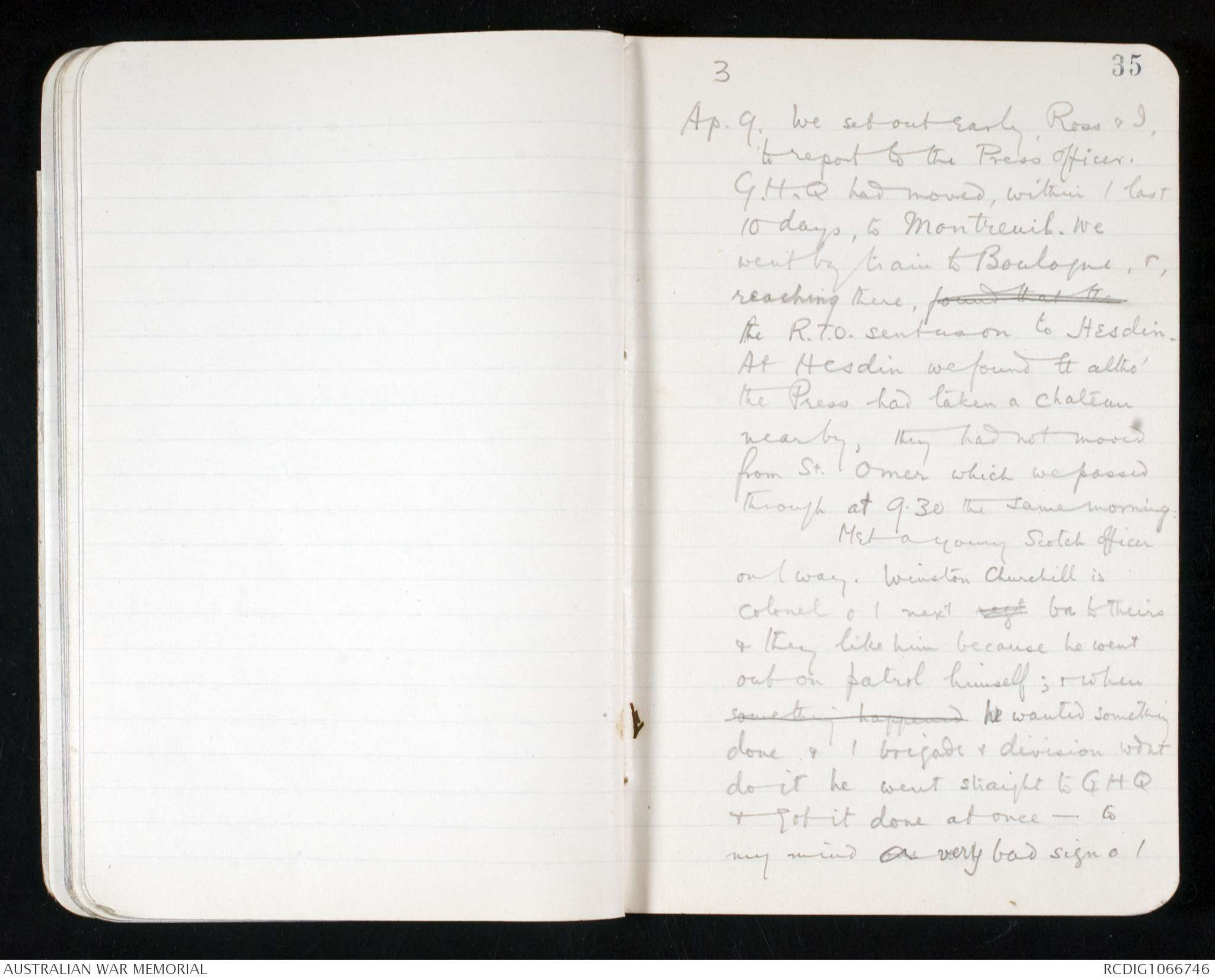
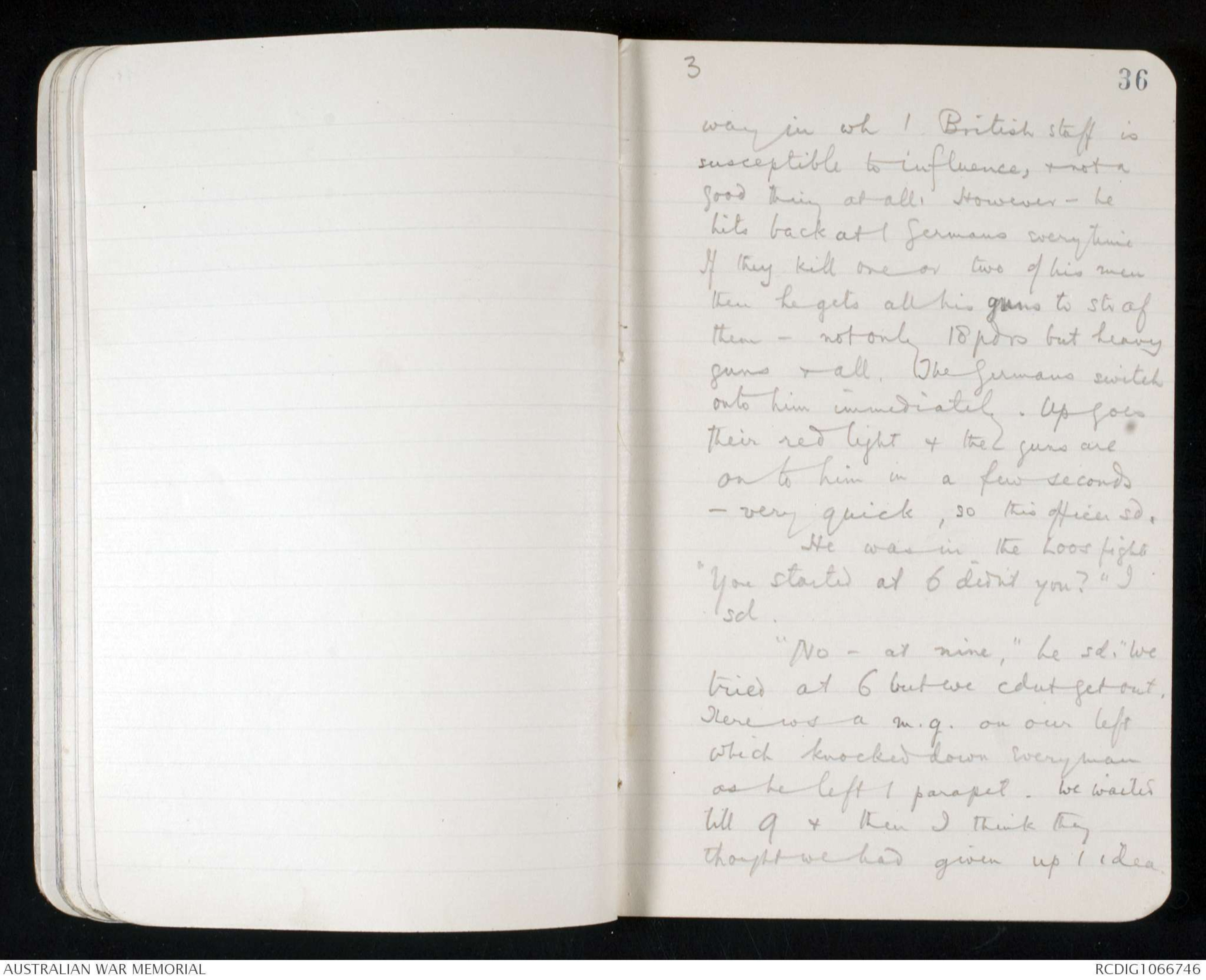
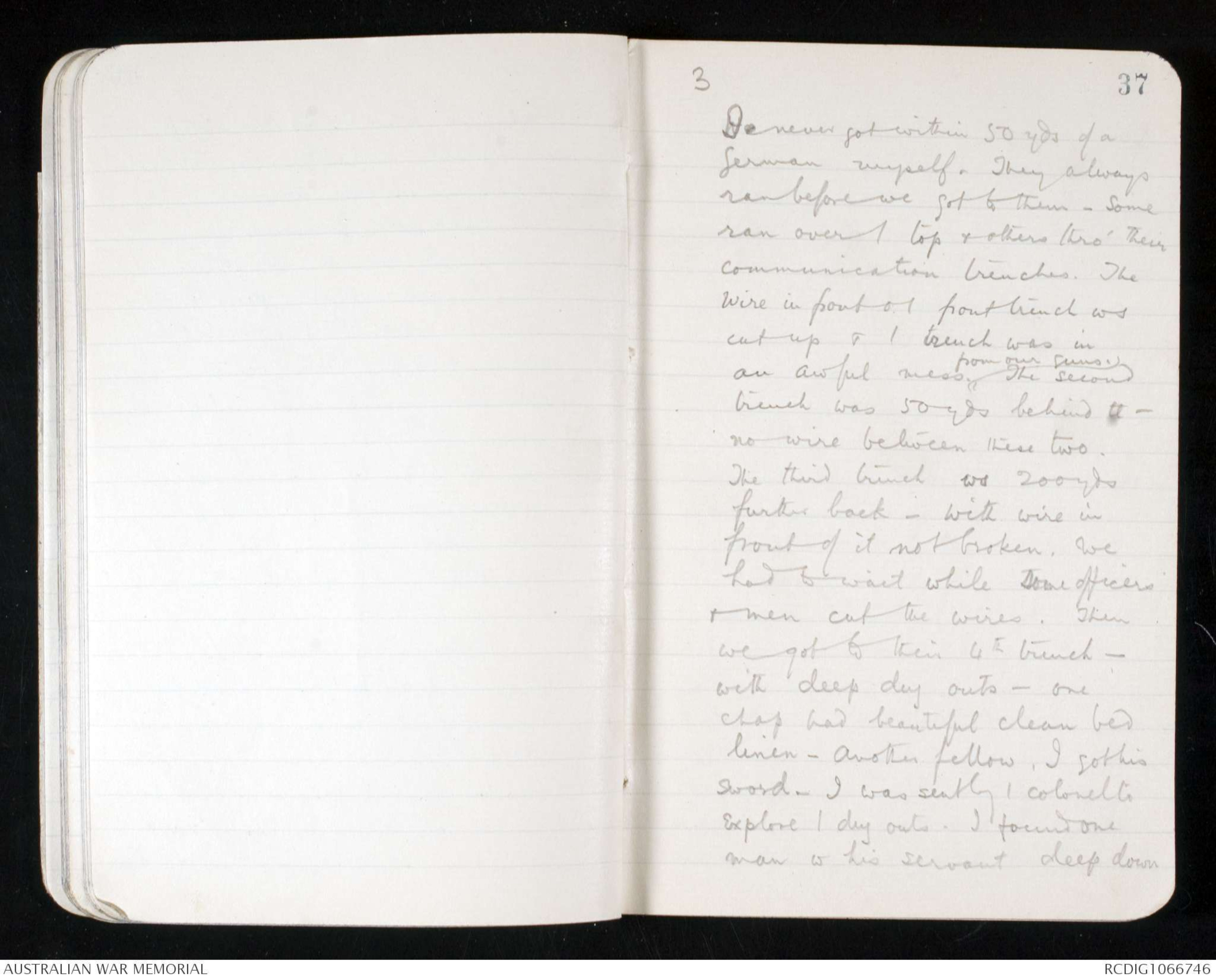
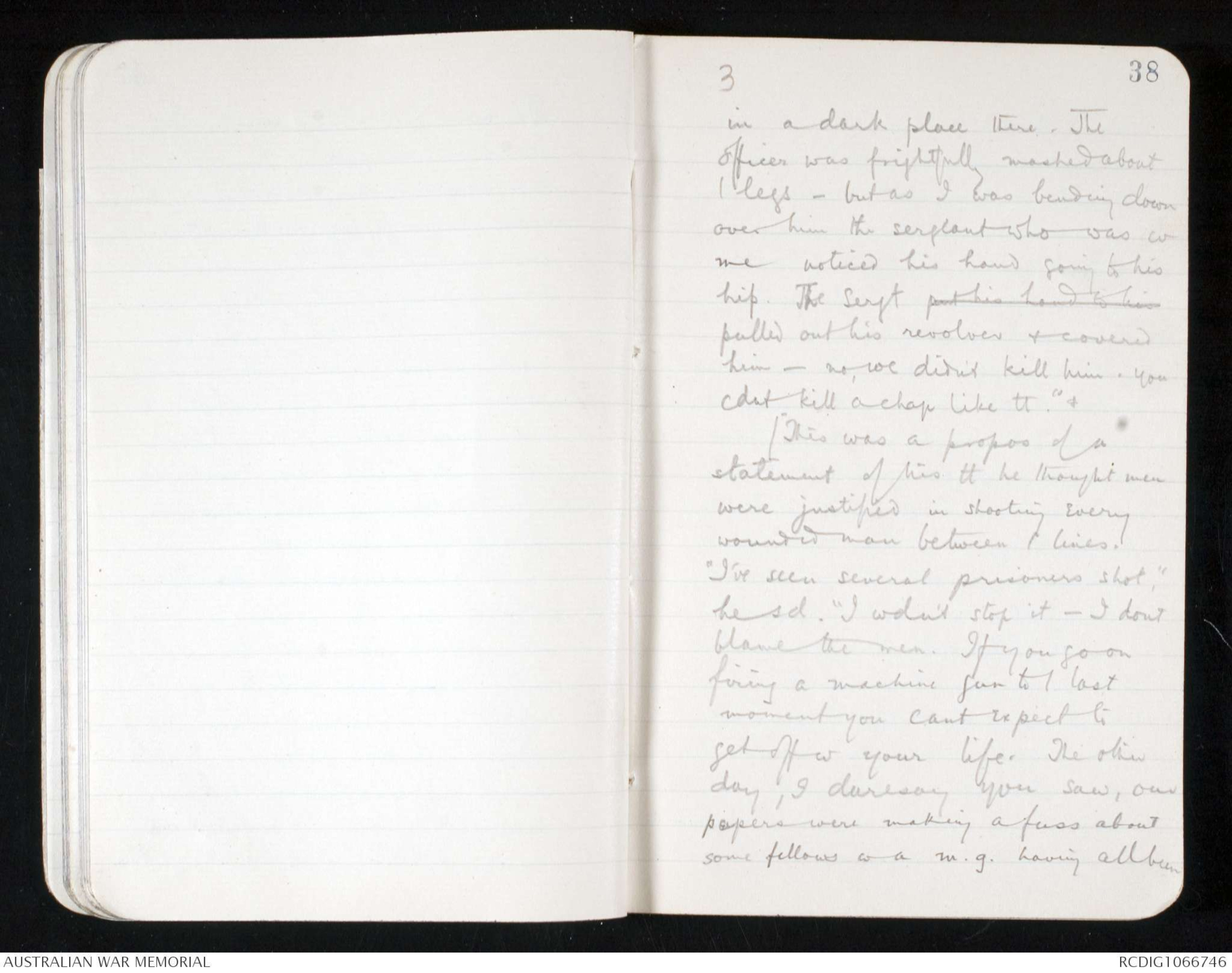
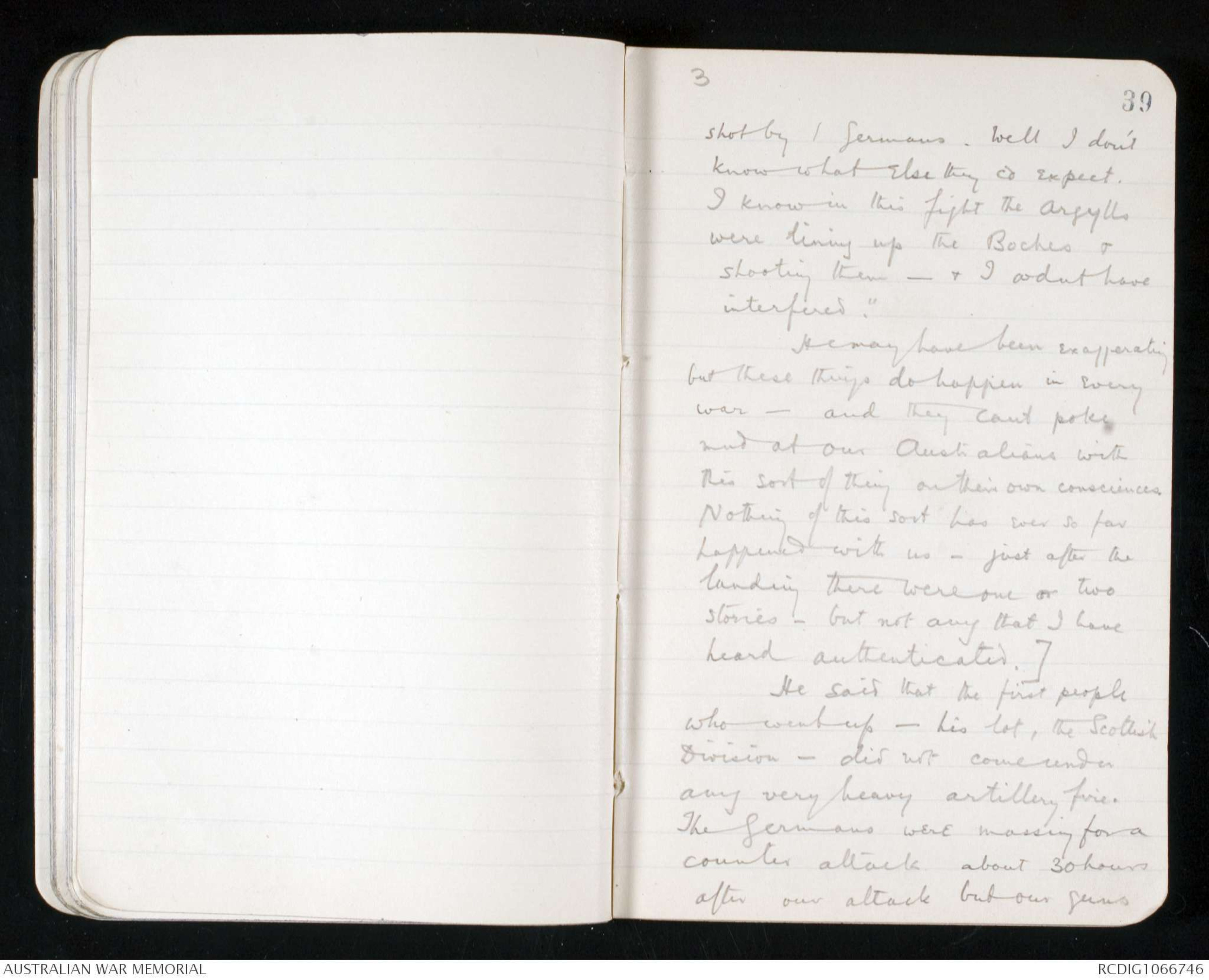
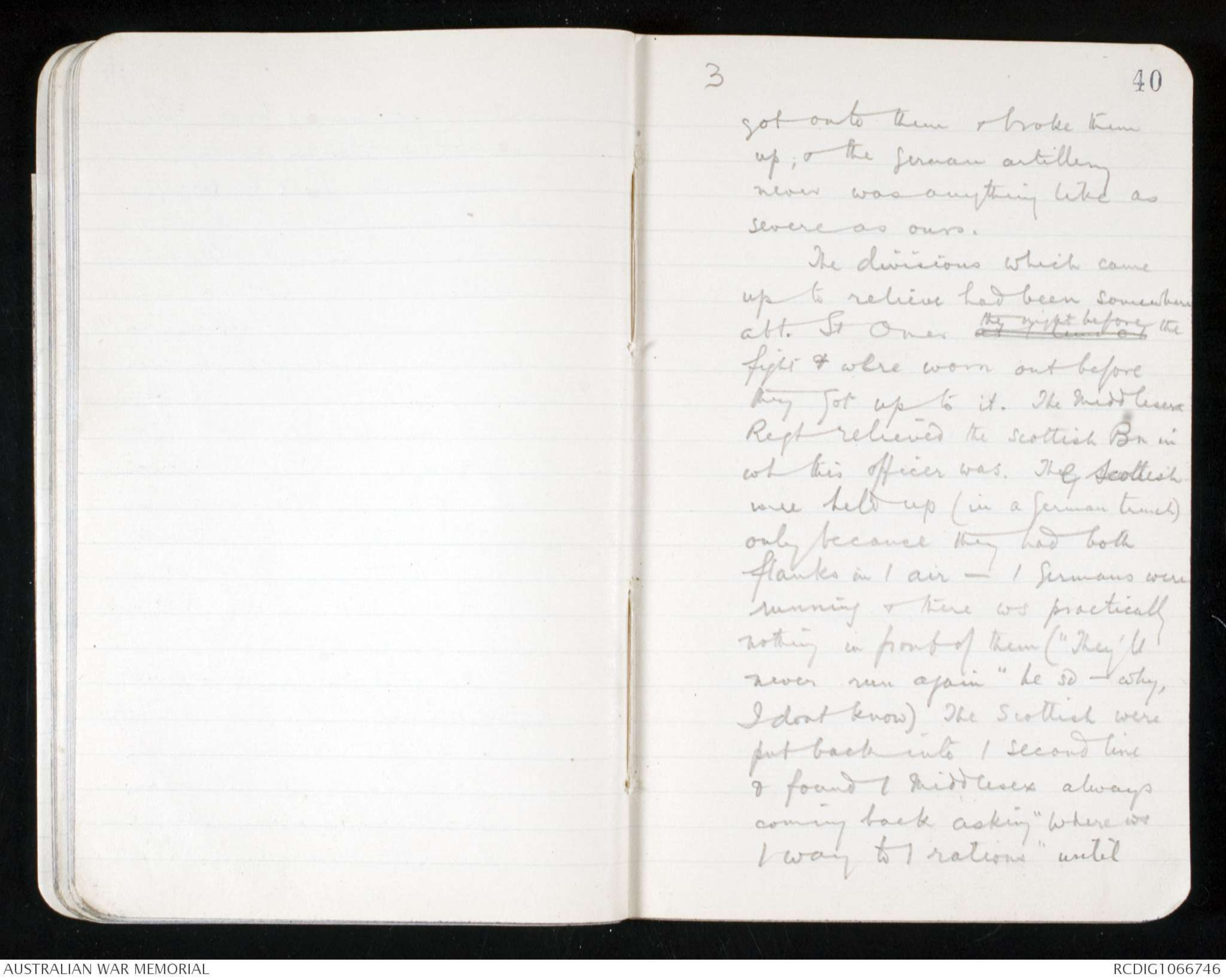
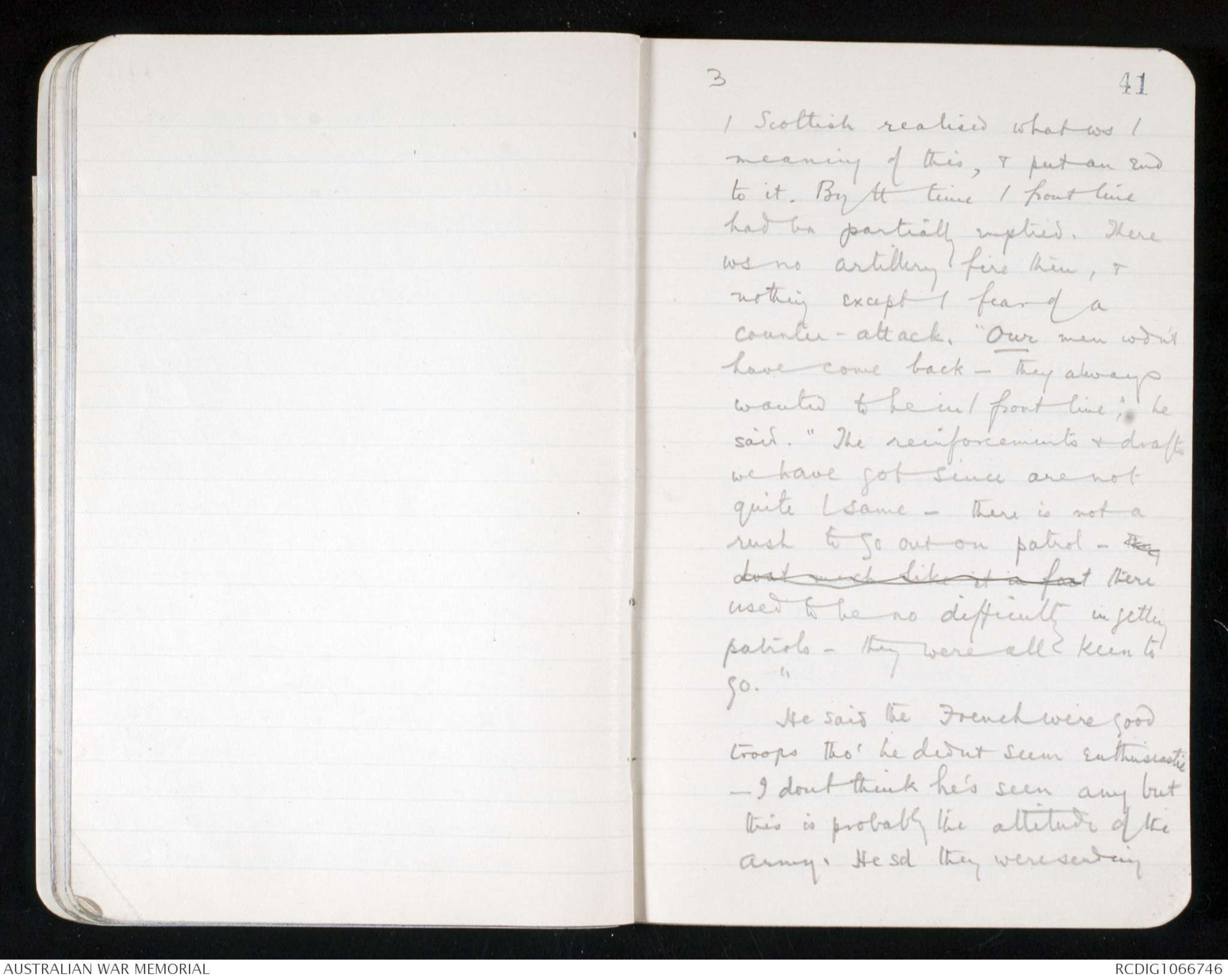
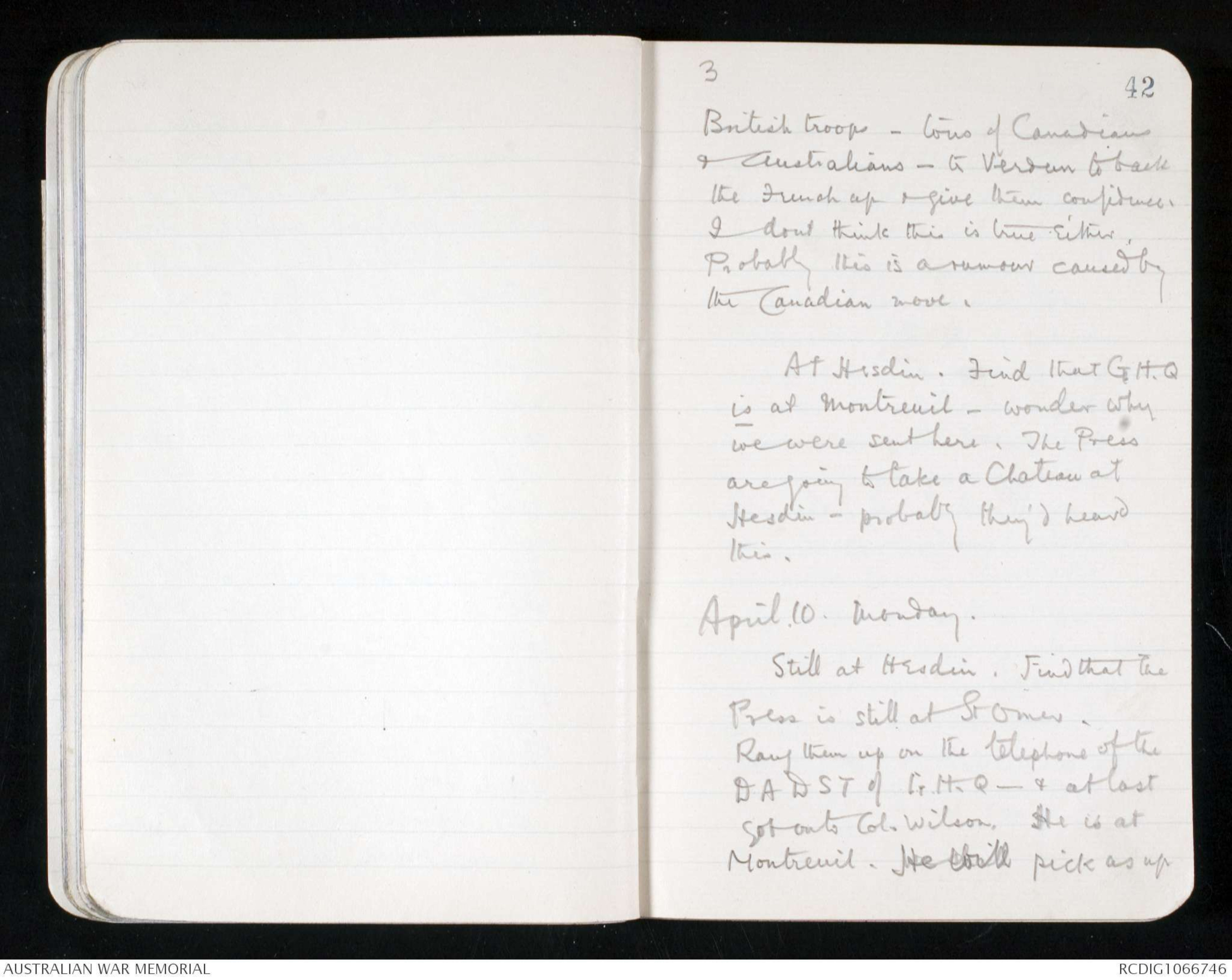
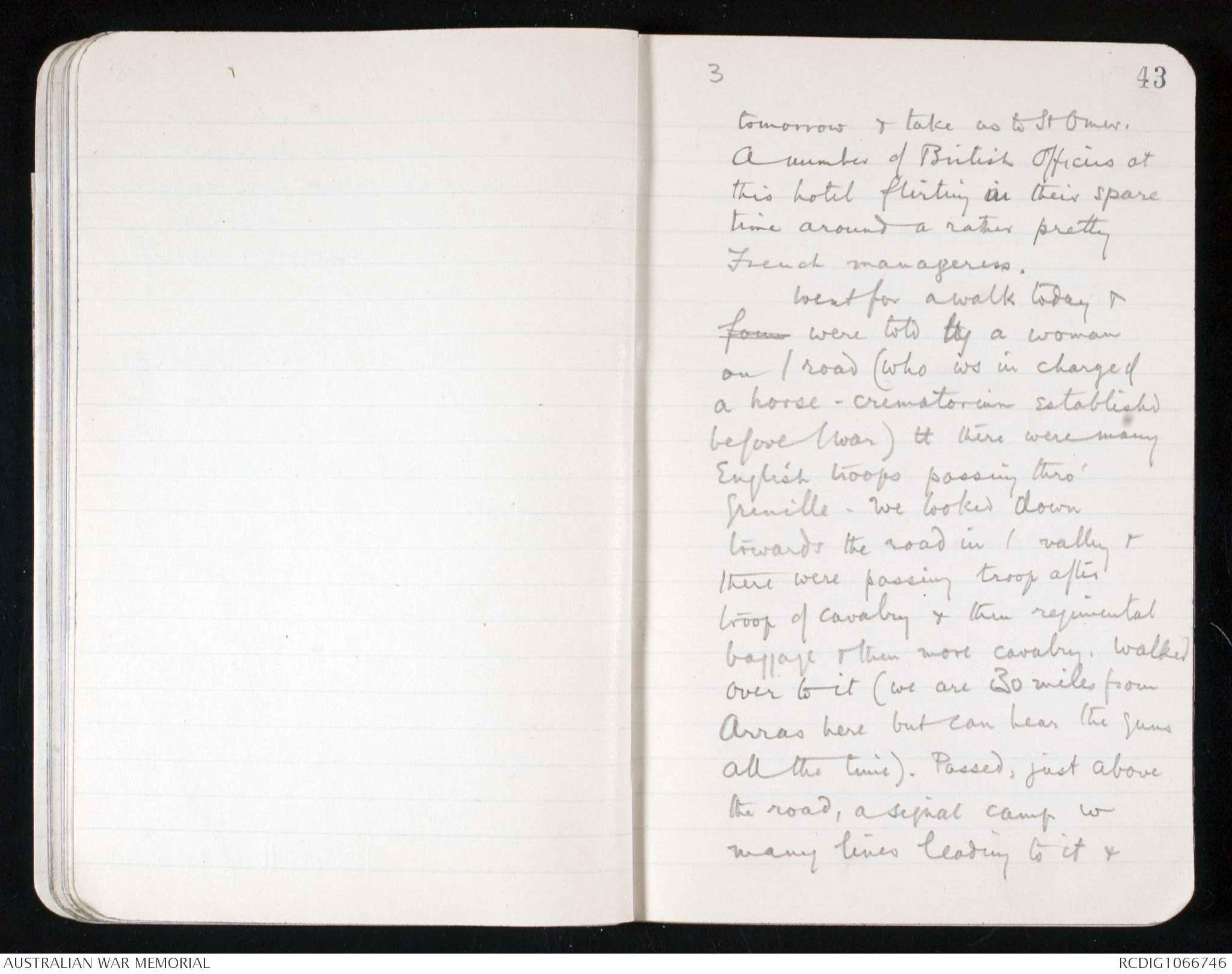
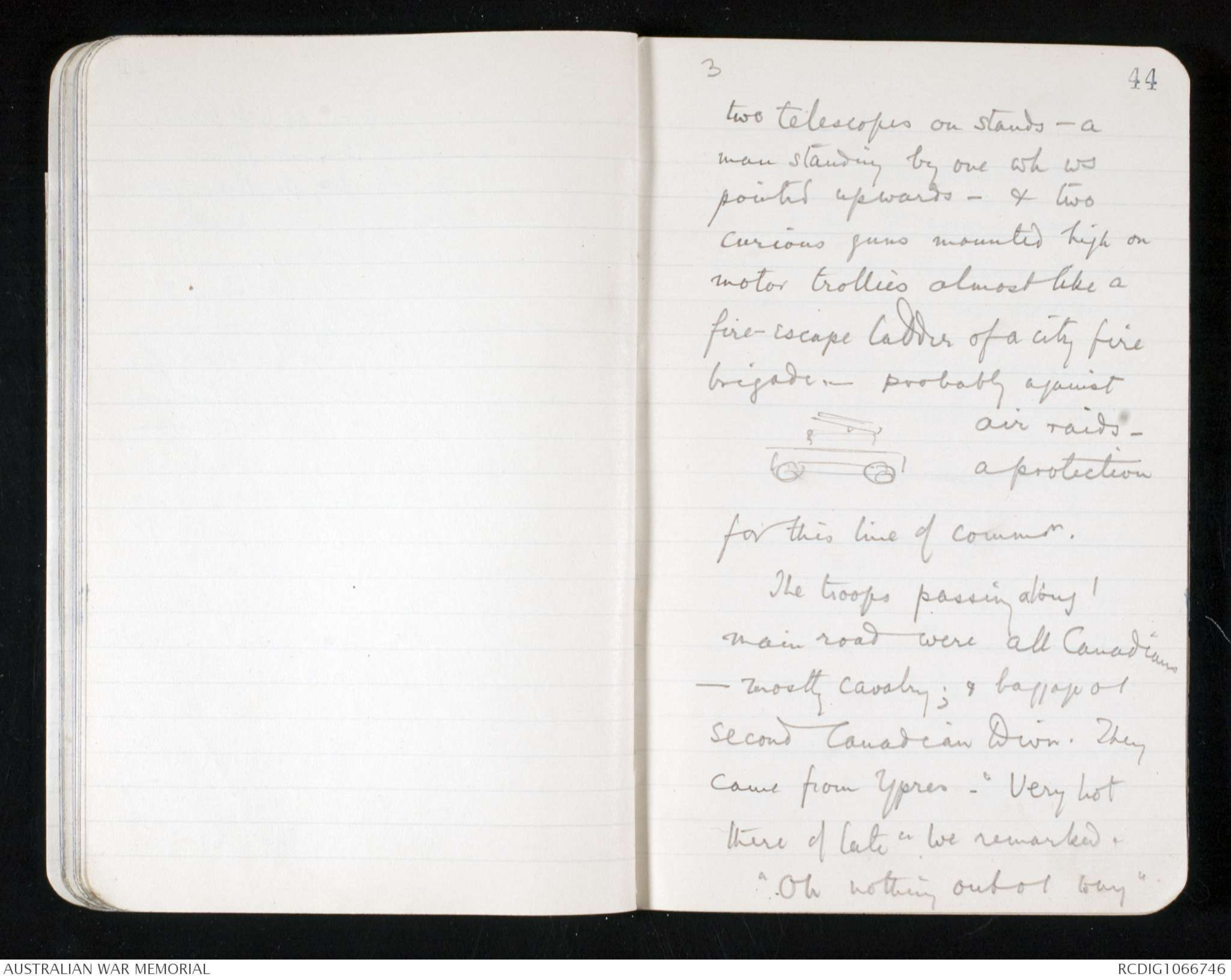
3 35
Ap. 9. We set out early, Ross & I
to report to the Press Officer.
G.H.Q had moved, within / last
10 days, to Montreuil. We
went by train to Boulogne,
reaching there, found that the
the R.T.O. sent us on to Hesdin.
At Hesdin we found tt altho'
the Press had taken a chateau
nearby, they had not moved
from St. Omer which we passed
through at 9.30 the same morning.
Met a young Scotch officer
on / way. Winston Churchill is
Colonel o / next regt bn to theirs
& they like him because he went
out on patrol himself; & whensomething happened he wanted something
done & / brigade & division wdnt
do it he went straight to G.H.Q
got it done at once - to
my mind a very bad sign o /
3 36
way in wh / British staff is
susceptible to influence, & not a
good thing at all. However - he
hits back at / Germans every time
If they kill one or two of his men
then he gets all his guns to straf
them - not only 18 pdrs but heavy
guns & all. The Germans switch
onto him immediately. Up goes
their red light & the guns are
on to him in a few seconds
- very quick, so this officer sd.
He was in the Loos fight
"You started at 6 didn't you?" I
sd.
"No - at nine," he sd. " We
tried at 6 but we cdnt get out,
There ws a m.g. on our left
which knocked down every man
as he left / parapet. We waited
till 9 & then I think the
thought we had given up / idea
3 37
I never got within 50 yds of a
German myself. They always
ran before we got to them - some
ran over / top & others thro' their
communication trenches. The
wire in front o / front trench ws
cut up & / trench was in
an awful mess from our guns. The second
trench was 50 yds behind tt -
no wire between these two.
The third trench ws 200 yds
further back - with wire in
front of it not broken. We
had to wait while some officers
& men cut the wires. Then
we got to their 4th trench -
with deep dug outs - one
chap had beautiful clean bed
linen - another fellow, I got his
sword. I was sent by / Colonel to
explore / dug outs. I found one
man w his servant deep down
3 38
in a dark place there. The
officer was frightfully mashed about
/ legs - but as I was bending down
over him the sergeant who was w
me noticed his hand going to his
hip. The Sergt put his hand to his
pulled out his revolver & covered
him - no we didn't kill him. You
cdnt kill a chap like tt".
[This was a propos of a
statement of his tt he thought men
were justified in shooting every
wounded man between / lines.
"I've seen several prisoners shot,"
he sd." I wdn't stop it - I don't
blame the men. If you go on
firing a machine gun to / last
moment you cant expect to
get off w your life. The other
day, I daresay you saw, our
papers were making a fuss about
some fellows w a m.g. having all been
3 39
shot by / Germans. Well I don't
know what else they cd expect.
I know in this fight the Argylls
were lining up the Boches &
shooting them. - & I wdn't have
interfered."
He may have been exaggerating
but these things do happen in every
war - and they can't poke
mud at our Australians with
this sort of thing on their own consciences
Nothing of this sort has ever so far
happened with us – just after the
landing there were one or two
stories - but not any that I have
heard authenticated.]
He said that the first people
who went up - his lot, the Scottish
Division - did not come under
any very heavy artillery fire.
The Germans were massing for a
counter attack about 30 hours
after our attack but our guns
3 40
got onto them & broke them
up; & the German artillery
never was anything like as
severe as ours.
The divisions which came
up to relieve had been somewhere
abt. St Omer at time of the night before the
fight & were worn out before
they got up to it. The Middlesex
Regt relieved the Scottish Bn in
wh this officer was. The Scottish
were held up (in a German trench)
only because they had both
flanks in / air - / Germans were
running & there ws practically
nothing in front of them ("They'll
never run again" he sd - why,
I dont know) The Scottish were
put back into / second line
& found / Middlesex always
coming back asking "Where ws
/ way to / rations" until
3 41
/ Scottish realised what ws /
meaning of this, & put an end
to it. By tt time / front line
had bn partially emptied. There
ws no artillery fire then, &
nothing except / fear of a
counter-attack. "Our men wdn't
have come back -they always
wanted to be in / front line," he
said. "The reinforcements & draft
we have got since are not
quite / same - there is not a
rush to go out on patrol - theydont much like it in fact there
used to be no difficulty in getting
patrols - they were all keen to
go."
He said the French were good
troops tho' he didn't seem enthusiastic
- I don't think he's seen any but
this is probably the attitude of the
army. He sd they were sending
3 42
British troops - tons of Canadian
& Australians - to Verdun to back
the French up & give them confidence.
I don't think this is true either,
Probably this is a rumour caused by
the Canadian move.
At Hesdin. Find that GH.Q
is at Montreuil - wonder why
we were sent here. The Press
are going to take a Chateau at
Hesdin - probably they'd heard
this.
April. 10. Monday.
Still at Hesdin. Find that the
Press is still at St Omer.
Rang them up on the telephone of the
DADST of G.H.Q - & at last
got onto Col. Wilson. He is at
Montreuil. He will pick us up
3 43
tomorrow & take us to St Omer.
A number of British Officers at
this hotel flirting in their spare
time around a rather pretty
French manageress.
Went for a walk today &foun were told by a woman
on / road (who ws in charge of
a horse-crematorium established
before / war) tt there were many
English troops passing thro'
Grenille. We looked down
towards the road in / valley &
there were passing troop after
troop of cavalry & then regimental
baggage & then more cavalry. Walked
over to it (we are 30 miles from
Arras here but can hear the guns
all the time). Passed, just above
the road, a signal camp w
many lines leading to it &
3 44
two telescopes on stands - a
man standing by one wh ws
pointed upwards - & two
curious guns mounted high on
motor trollies almost like a
fire-escape ladder of a city fire
brigade - probably against
air raids -
Diagram - see original document
a protection
for this line of commn.
The troops passing along /
main road were all Canadian
- mostly cavalry; & baggage of
second Canadian Divn. They
came from Ypres - "Very hot
there of late" we remarked.
"Oh nothing out o / way"
 Loretta Corbett
Loretta CorbettThis transcription item is now locked to you for editing. To release the lock either Save your changes or Cancel.
This lock will be automatically released after 60 minutes of inactivity.